- Home
- Michael Chabon
The Final Solution Page 9
The Final Solution Read online
Page 9
He opened his beak and emitted, in a way that pressed very satisfyingly on the raw place inside him, a series of low chuckling coughs. This allusion to Kalb’s characteristic odor, though the man would have had no way of knowing it, constituted a faithful and exact reproduction of the sound produced by the Blue Minorcans that had scratched in the back garden of le Colonel’s house in Biskra, Algeria, in particular of one strapping blue and white lady whose coloration Bruno had always admired.
The next moment he paid rather dearly for his little joke, however, when the man snatched up a canvas laundry sack and dived at Bruno, grasping him unfairly but effectively by the legs. Before Bruno could get hold of Kalb’s hand or nose or earlobe with the mighty implement, horn and shears and mouth and hand, that was his sole pride and vanity and treasure in the world, he found himself thrust into darkness.
From within the laundry sack he heard the sound of the man gathering up his scattered sheets of claw marks, and then the creak of the wardrobe door. The darkness around him resounded with an unmistakably wooden vibration and he understood from this that he was going to be put inside the wardrobe. He felt his head strike against something and then there was a flash in his skull, vivid as the breast feathers of that long-since-eaten Blue Minorcan chicken. Next a clatter, as his perch itself tumbled in alongside, jostling him; a soft splash of water from the little tin dish attached to the crossbar. Then another creak as Kalb closed the wardrobe, sealing Bruno up.
Bruno lay perfectly still, paralyzed by darkness and the light that had burst in his skull. When the knock sounded at the door he tried to sing out but found that he could not move his tongue.
“Mr. Kalb?” It was Mrs. Dunn. “The police are here. They want to speak to you.”
“Yes, all right.”
There was the sound of the tap running, the chiming of the shaving brush against the cup. And then the clatter of the lock on the door.
“Mr. Martin Kalb?”
“That’s right. Has something happened?”
There followed a brief murmured exchange of song between the men, one to which Bruno paid little attention. He was badly disoriented, and the effects of the man’s brutality toward him lingered, ringing in his cranium. This disturbed him, for it seemed to demand to be echoed, repeated—it called for retribution—and yet violence was as foreign to him as silence itself.
“So you have no idea what could have become then of the boy’s parrot?” he heard one of the men saying. He recognized the voice as that of the old, broken-down man with the admirable beak of flesh, who had come flapping out of his lair to frighten the boy and him on that dazzled afternoon along the tracks.
“I’m afraid not. What an insupportable loss.”
It grew increasingly difficult to breathe; there was not enough air in the sack. And then a moment arrived when Bruno felt that he might just stop breathing, give it up, allow all the sad wandering and cruelty of his captivity to come at last to a gentle dark finale. He was prevented in the end from doing so only by the unexpected hope, entirely alien to his nature and temperament, of sinking his talons into the skin of Kalb’s throat, of biting off the tip of the hated pale snout.
“And you never met Mr. Richard Shane?”
“Alas, no.”
Though the man had cinched it shut, the laundry sack was made from rather thin canvas. Bruno gave his jaws an experimental clack.
“Would you have any objection, sir, to our having a look round your room?”
The material offered little resistance to his efforts; chewing it was not unpleasurable.
“Ordinarily, Inspector, I would have no objection at all, but you catch me at a most inopportune moment. One of my children has fallen gravely ill, I’m afraid, and I’m just on my way now to see to her. Not one of my, ah, actual children, of course—perhaps you are aware of my work with the Aid Committee.”
Neat as Herr Wierzbicka with his great glinting scissors Bruno chewed a slit in the canvas sack, then a second slit running at right angles to the first. He grasped the loose corner in his bill and gave a sharp yank. There was a soft ripping sound as a flap tore away from the sack. It was an interesting sound—ksst, ksssst—and Bruno would have liked to produce it himself, but his mouth was filled with canvas and furthermore the hole was still not large enough. At any rate it was not easy for a parrot to sing when it was in the grip of a dark emotion such as the rage that now suffused him.
“I’m terribly sorry, but I must ask you … have you come to arrest me?”
“No, no. Not at all.”
Bruno gave another yank on the flap, then poked his head through the hole he had made. There was an alteration in the quality of darkness; he could see a shimmering seam running all the way around the edges of the wardrobe door.
“And I’m not—I can hardly imagine that I would be under suspicion—”
“Not at all. But we would like to put a few questions to you.”
“Then I really must ask you, for now, to excuse me. I have to make a train for Slough in—oh, my goodness, twenty-five minutes. I would be happy to come down to Scotland Yard and speak to you. Later today, perhaps four or four-thirty. Would that be all right?”
“All right, then,” said the one called Inspector, employing tones of regret and doubtfulness. There was the scrape and susurrus of the men’s feet and they turned for the door.
Bruno struggled, flapping and scrabbling, to free the remainder of his body from the sack. One of his wings struck the cold shaft of his perch, and having found it he gripped the metal tightly with a talon. Using the shaft as purchase on the darkness he launched himself against the wardrobe door, prepared when it swung open to fly at the throat of the man and expose the red meat within.
This time there was no flash inside his skull; it was his body that struck the door, smacking the breath from his lungs like the back of a massive wooden hand. He lay at the bottom of the wardrobe, failed and trembling and gasping for air. He opened his mouth to sing of his impotence, his anger, his hatred of the man who had taken him away from Linus Steinman. For a long moment nothing emerged from his paralyzed throat. The room beyond the wardrobe door was deeply, almost audibly silent, as if all the creatures there were waiting to hear whatever it was that Bruno might—must—manage to say. In the instant before he lost consciousness he felt, rather than heard, the low gutteral chuckle that bubbled up from him, and the words of the inspector beyond the door.
“Are you keeping a chicken in your wardrobe, then, Mr. Kalb?”
11
The boy watched, unsmiling, his dark blazer neat and pressed, his collar buttoned, his rep necktie, which he looked to have knotted himself, dangling limply in the heat. He might have been awaiting the passage of a funeral. The old man stood on the top of the carriage stairs with the wire cage, hooded, at his feet.
The train swayed slowly toward the end of the platform. Lamentations and irritable bovine sighing from the engine. The inspector stood behind the old man, clearing his throat as if in expectation of making a few modest remarks on this satisfactory occasion. It had been agreed among the three men—Mr. Panicker lingered in the corridor—that it was to the eldest of them that the honor of returning bird to master would fall. The old man supposed that this was only fair; he had not merely permitted but insisted that Inspector Bellows take and receive full credit for the apprehension and arrest of the murderer Martin Kalb. As for the minister’s reasons for declining the honor, his role in the adventure of the bird’s return, marginal perhaps but true, appeared in the long run to have done little to improve his view of things. He had been gloomy and taciturn the whole way down from London, sitting in the smoking car scattering pipe ash all over his dull layman’s clothes. He was coming home, it seemed to the old man, rather with his tail between his legs.
Apart from his wife and the boy, the platform of the country station was, but for the local postmaster and a pair of young women dressed for a day down at Eastbourne, deserted. The vicar’s son had chosen not to w
elcome his father home; according to the inspector, Reggie Panicker had fled Sussex “for good one does hope,” though the old man considered that perhaps it would have been more charitable to say that Reggie had gone in search of a place where his shortcomings of character were less well catalogued, where his unfortunate history would not forever be held against him, where he would not be the likeliest suspect for every wrong deed committed in the neighborhood, and, crucially, where a vengeful Fatty Hodges would not be able to track him down.
The train shuddered then fell still. The boy took a step toward the carriage, a step so tentative that the old man saw Mrs. Panicker press a hand against the back of his neck to encourage him.
“You’d think he could manage a smile, at least,” Mr. Panicker said, brushing ash from his shirtfront. “Today of all days. Good God. Lucky to have the bird at all.”
“True enough,” the old man said. He wondered a little, still, that the parrot, until recently the object of intense regard at the highest levels of government, had been so rapidly and without apparent interest discharged from official custody. Amid the absolute indifference of Colonel Threadneedle’s office to the disposition of Bruno, there were hints given out that enemy codes had been changed, rendering inutile whatever secret information Bruno might possess. These hints were proffered with just enough offhand firmness as to leave the old man persuaded that in fact something deeper was afoot. Perhaps, he thought, some better, more reliable means of decipherment had been arrived at than a middle-aged and somewhat perverse polyglot bird. “A smile would not be at all unwelcome.” In fact the old man felt a strong desire, nearly an ache, to see the reflection of happiness in the boy’s face. The business of detection had for so many years been caught up with questions of remuneration and reward that although he was by now long beyond such concerns he felt, with surprising vigor, that the boy owed him the payment of a smile. But as Linus Steinman approached the train, his eyes on the hooded dome at the old man’s feet, his expression did not alter from its habitual blankness, apart, perhaps, from a flicker of anxiety in the eyes, even of doubt. It was a look that the old man recognized, though for an instant he could not recall whence. But perhaps it was not too different from the doubt that haunted the eyes of the Reverend Mr. K.T. Panicker.
Well, the old man thought. Of course he’s worried: he can’t see his friend.
“Here,” he said, brusquely, to the vicar. He lifted the cage, not without difficulty, and handed it to Mr. Panicker. The vicar started to shake his head, but the old man pressed the cage toward him with all the strength in his arms. He gave the vicar a shove, none too gently, toward the stair. Then as Mr. Panicker hesitantly stepped down from the train, the old man reached over with a crooked trembling arm and tugged the oilcloth hood from the cage, revealing with a conjuror’s flourish the scarlet tail, the powerful black bill, the bottomless black eyes, the legs of red.
The boy smiled.
Mr. Panicker ruffled his hair, a little stiffly. Then he turned to face his wife.
“Well done, Mr. Panicker,” she said, and she offered him her hand.
The boy took the cage from Mr. Panicker, and lowered it to the platform. He worked the wire latch, opened the cage door, and thrust in his hand and arm. Bruno stepped nimbly on, and then as the boy drew him out, inched his way up the dark blue sleeve to the shoulder, where, in an echo conscious or accidental of the vicar’s awkward gesture of a moment before, he worked his bill tenderly through the dark curls above the boy’s right ear.
Mrs. Panicker watched for a moment, her own smile at the sight of bird and boy reunited both ironic and wistful, as one might contemplate the salt and pepper shakers or favorite pair of socks that alone survived the burning of one’s house to the ground. Then she turned to the inspector.
“So is he rich, then?” she said.
“He very well might be,” Inspector Bellows said. “But so far as we—or, I might add, as Mr. Kalb—has been able to determine, those endless digits of the bird’s do not in fact represent numbered Swiss bank accounts. Even though Kalb had his brother working overtime in Zurich trying to track them down.” Mrs. Panicker nodded. She had suspected as much. She went over to stand with her husband, the boy, and Bruno.
“Hello,” the parrot said.
“Hello, yourself,” she said to the parrot.
“I doubt very much,” the old man said, “if we shall ever learn what significance, if any, those numbers may hold.”
It was not, heaven knew, a familiar or comfortable admission for the old man to make. The application of creative intelligence to a problem, the finding of a solution at once dogged, elegant, and wild, this had always seemed to him to be the essential business of human beings—the discovery of sense and causality amid the false leads, the noise, the trackless brambles of life. And yet he had always been haunted—had he not?—by the knowledge that there were men, lunatic cryptographers, mad detectives, who squandered their brilliance and sanity in decoding and interpreting the messages in cloud formations, in the letters of the Bible recombined, in the spots on butterflies’ wings. One might, perhaps, conclude from the existence of such men that meaning dwelled solely in the mind of the analyst. That it was the insoluble problems—the false leads and the cold cases—that reflected the true nature of things. That all the apparent significance and pattern had no more intrinsic sense than the chatter of an African gray parrot. One might so conclude; really, he thought, one might.
At that moment the ground rumbled faintly, and in the distance, growing nearer, there was the cry of iron wheels against iron rails. A train was passing through the station, a freight, a military transport, its cars painted dull gray-green, carrying shells and hams and coffins to stock the busy depots of the European war. The boy looked up as it tottered past, slowing but not coming to a stop. He watched the cars, his eyes flicking from left to right as if reading them go by.
“Sieben zwei eins vier drei,” the boy whispered, with the slightest hint of a lisp. “Sieben acht vier vier fünf.”
Then the parrot, startled perhaps by the clamor of the passing train, flew up into the rafters of the station roof, where, in flawless mockery of the voice of a woman whom none of them would ever meet or see again, it began, very sweetly, to sing.

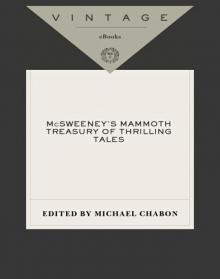 McSweeney's Mammoth Treasury of Thrilling Tales
McSweeney's Mammoth Treasury of Thrilling Tales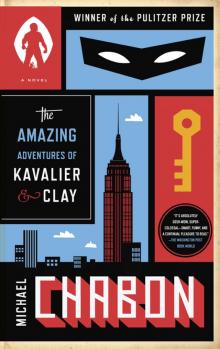 The Amazing Adventures of Kavalier & Clay
The Amazing Adventures of Kavalier & Clay The Yiddish Policemen's Union
The Yiddish Policemen's Union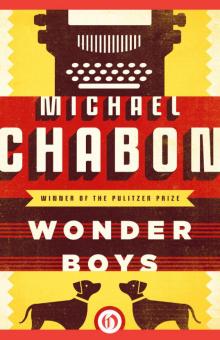 Wonder Boys
Wonder Boys Manhood for Amateurs
Manhood for Amateurs Kingdom of Olives and Ash: Writers Confront the Occupation
Kingdom of Olives and Ash: Writers Confront the Occupation Gentlemen of the Road: A Tale of Adventure
Gentlemen of the Road: A Tale of Adventure A Model World and Other Stories
A Model World and Other Stories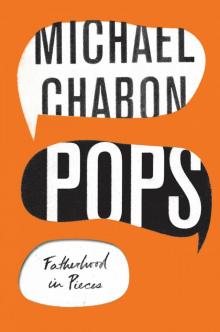 Pops: Fatherhood in Pieces
Pops: Fatherhood in Pieces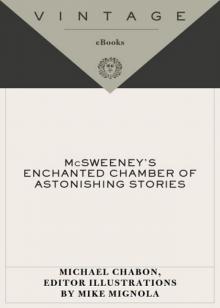 McSweeney's Enchanted Chamber of Astonishing Stories
McSweeney's Enchanted Chamber of Astonishing Stories Summerland
Summerland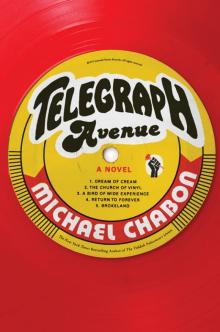 Telegraph Avenue
Telegraph Avenue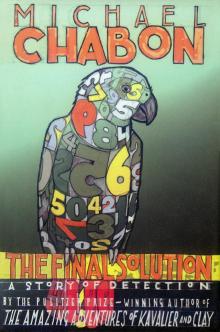 The Final Solution
The Final Solution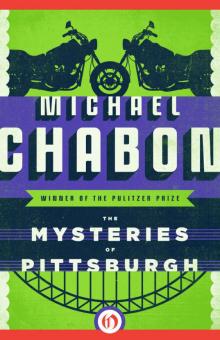 The Mysteries of Pittsburgh
The Mysteries of Pittsburgh Werewolves in Their Youth
Werewolves in Their Youth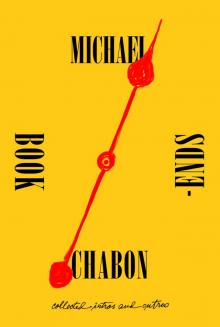 Bookends
Bookends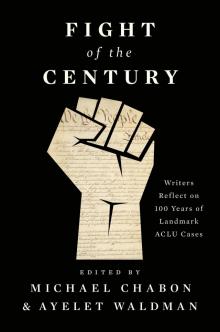 Fight of the Century
Fight of the Century Maps and Legends
Maps and Legends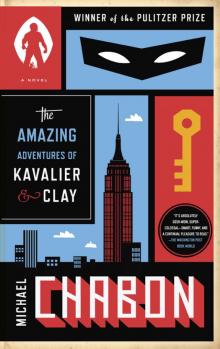 The Amazing Adventures of Kavalier & Clay (with bonus content)
The Amazing Adventures of Kavalier & Clay (with bonus content) Kingdom of Olives and Ash
Kingdom of Olives and Ash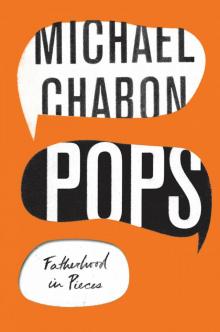 Pops
Pops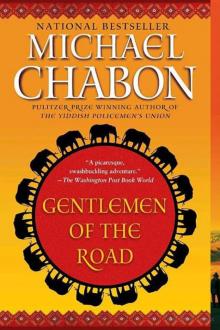 Gentlemen of the Road
Gentlemen of the Road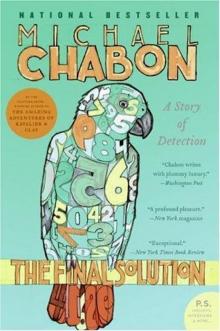 The Final Solution: A Story of Detection
The Final Solution: A Story of Detection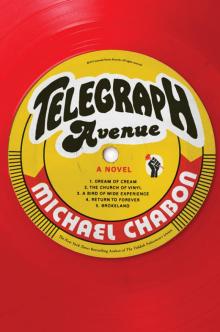 Telegraph Avenue: A Novel
Telegraph Avenue: A Novel